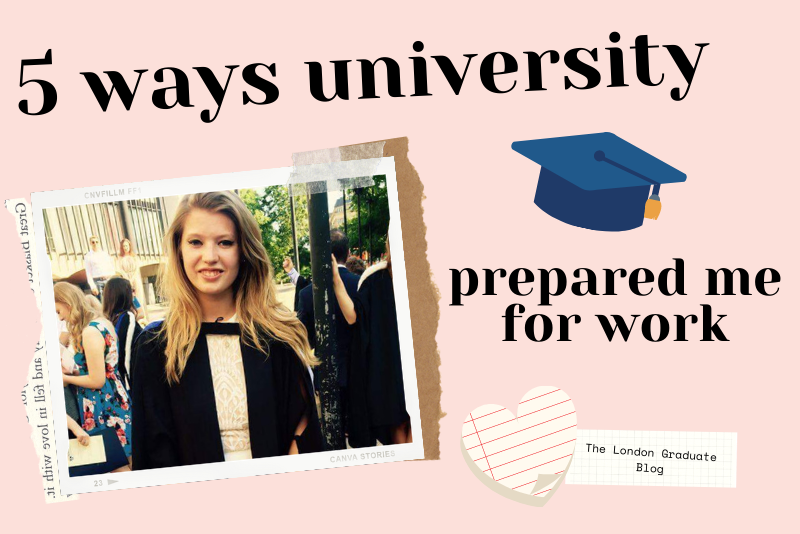A lot of people find that they do not really use their degree once they leave university. Many go into a completely unrelated field and have to build up new knowledge of a different subject area.
However that doesn’t mean that university was a waste of time. There are plenty of transferable skills that you pick up from university that can help you in your future career.
Here’s 5 ways university prepared me for work, outside of the subject matter of my degree.

1. Time management
In my final year of university I had to juggle part time work, university assignments, lectures, job applications and socialising, if I got time. This meant I had to get good at time management in order to keep everything ticking along. My part time job was during weekdays, so I tended to catch up on university work on the weekends. I would go to the library most weekends to study and finish my assignments for the week.
In my full time job, I have to juggle multiple projects and priorities at the same time. It is no good focusing on one piece of work and forgetting to progress something else that you have on. In work, as at university, no-one is going to watch you during the day and tell you when to do different things. It’s up to me to plan my week and make sure I can get everything done that I need to.
At university, I had a diary where I kept track of all due dates for assignments. In my job, I don’t use a diary but I do keep track of projects and deadlines in Microsoft onenote and refer back to it each day to make sure I am staying on track. I also use my work calendar a lot to keep track on when events and meetings are happening and any deadlines coming up.

2. Networking
Networking is a skill that comes naturally to some and is hated by others with a passion. I have always been a naturally shy person so meeting strangers is something I used to avoid.
However at university I was constantly meeting new people. In my first year, I met my new flatmates, others living in my halls and those on my course. This got me used to introducing myself and how to build relationships from scratch. Going into my later years, I started volunteering at university open days. I worked as a campus tour guide and took groups of prospective students and their parents around campus. Again this got me used to talking to strangers. Also as I was representing the university, it gave me a flavour of networking in more professional capacity.
In the world of work, building a network is really useful. It gives you a range of contacts to go to when you need help or advice. You never know what opportunities can come later down the line through keeping your network close.
I would now describe myself as a natural networker. I love being around people and catching up with those I previously worked with to find out what they are up to. Now, I’m even beginning to get a reputation for being well connected.

3. Problem Solving
I studied Maths and Statistics at university. One of the key transferable skills from my degree was problem solving. In my course we would get taught basic material, but then in our assignments we would be asked questions where we had to apply our knowledge to unseen problems. I learnt to think logically to solve these problems and work through different steps to find a solution.
In work, I do not have to answer complex maths problems, however I do deal with problems all the time e.g. when looking at big data sets, planning complex projects and resource management. To solve them I go through roughly the same process; breaking down the problem into small parts, starting with something simple and then expanding to cover each area.
One difference between problem solving at work and problem solving in my degree is that in maths there is generally only one right solution, although there may be different ways of arriving there. In work, there are many possible options and it takes a little adapting to get used to a more uncertain world.

4. Dealing with Pressure
University can often be a stressful place. There is the pressure to do well and get good grades, the pressure to land a good summer internship, pressure to make lots of friends and pressure to keep pace with your peers.
I felt the pressure for all these things, in particular the pressure of doing well in exams. 80% of my overall course grade was made up of exam scores and twice a year I had around 6 – 8 exams. This pressure hit a peak in my final year and I had to develop my own techniques to cope.
I took up running at university. During exam season I aimed to go every morning before I started my revision for the day. I restricted my revision time to set hours (10am – 6pm) and allowed myself to think about other things outside of these times. After an exam, I gave myself a break from work and dedicated the day to self care. (This generally involved painting my nails, watching a film and eating chocolate.)
Work can also be a high pressure environment. I often have to deal with competing priorities, tight deadlines and high expectations from senior leaders. It is important in working life, like during exam time, to only focus on these things during work hours and to switch off outside this time.

5. Presentations
When I was at school I hated public speaking. I got anxiety for weeks before class presentations and had resigned myself to the fact that I would never enjoy public speaking. However at university, I was forced into public speaking once again as part of some group and individual assignments. As I was older now, I was determined to improve my skills so I would not make a fool of myself in front of everyone on my course.
While practicing I developed new skills that I still do in presentations now. I prepared the key points I wanted to get across and wrote them down onto flash cards. Then, I practiced saying each one out loud and recorded myself on my phone to check how it was coming off. I also got into the habit of practicing giving the presentation in the exact room where I would be giving it for real. This helped me get comfortable in the space so for the real presentation, it already felt familiar.
At work I have to give presentations often and I still use all these techniques now. While I have developed my presentation style further, the basics I build at university still form the core part of my presentation preparation.
*
Of course, there were also a lot of things uni didn’t teach me. There were plenty of things I had to pick up for the first time once I started my job.
Next month, find out the five ways uni didn’t prepare me for work.








